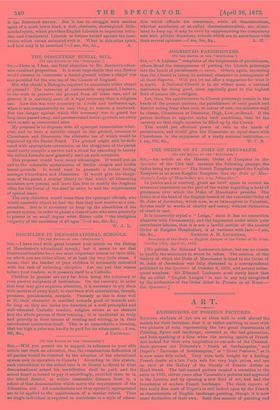THE DISSENTERS' BURIAL BILL.
[To THE EDITOR OF THE " SPECTATOR."]
Sir,—There is, I fear, one fatal objection to Mr. Bartlett's other- wise excellent proposition. It is most improbable that any Bishop would consent to consecrate a burial-ground unless a chapel was also provided for the sole use of the Church of England.
But why should a Bishop be required to consecrate either chapel or ground? The ceremony of consecration originated, I believe, in the wish to preserve the ground from all other uses, and at present it is certainly more of a legal ceremony than a religious one. Now this was very necessary in a rude and barbarous age, when it was comparatively an easy thing to remove a landmark. But the danger against which this ceremony was to guard has long since passed away, and unconsecrated burial-grounds are every whit as safe as consecrated ones.
My proposal is to dispense with all episcopal consecration what- ever, and to have a suitable chapel in the ground, common to Churchmen and Dissenters, the alternate use of which would be regulated by the Burial Board. The ground might still be dedi- cated with appropriate ceremonies, as the clergyman of the parish could easily compile a service and a ritual far exceeding in beauty the stilted formulm now generally used on such occasions.
This proposal would have many advantages. It would put an end to the miserable sectarianism of double chapels and double burial-grounds. It would tend to promote a better feeling amongst Churchmen and Dissenters. It would give the clergy- man of the parish a similar liberty to that which all Dissenting ministers now possess, and leave him free to modify the Anglican office for the burial of the dead in order to suit the requirements of special cases.
The only objection would come from the episcopal officials, who would naturally object to lose the fees they now receive at a con- secration. But is it necessary to keep up the absurdities of the present system, in order to please a class of men who seem generally to possess in no small degree what Renau calls "the irreligious vulgarity of the sacristans of all ages "?—I am, Sir, &c., W. J. L.


































 Previous page
Previous page